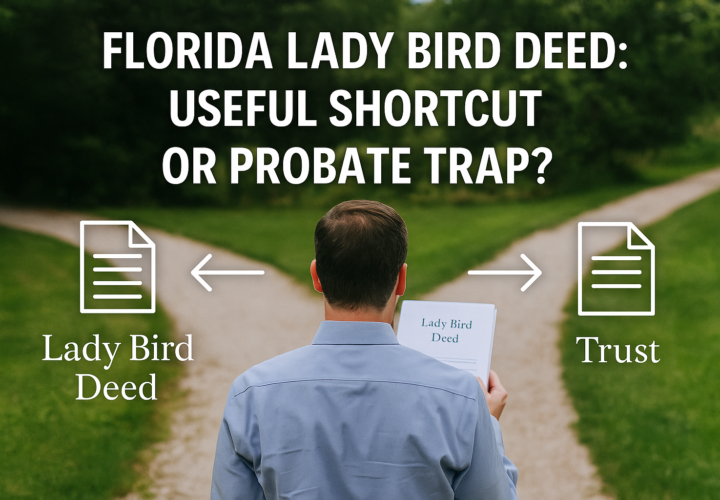Florida’s property tax laws are designed to maintain fairness and consistency while allowing certain protections for property owners. When property ownership changes hands, the property’s taxable value may be reassessed, potentially leading to an increase in property taxes. However, not all transfers result in reassessment. Knowing which transfers trigger a reassessment and which are exempt is crucial for estate planning and real estate transactions.
When Property is Reassessed
Under Florida law, property is typically reassessed to its current market value when there is a “change of ownership or control.” This often results in a higher taxable value, as the property is no longer protected by the previous owner’s tax caps under the Save Our Homes (SOH) Amendment or other assessment limitations (Fla. Const. art. VII, § 4(d)). Common scenarios where property reassessment occurs include:
- Sale of Property
- When a property is sold to a new owner, it is reassessed based on the purchase price or current market value (Fla. Stat. § 193.155(3)).
- Transfer of Ownership Outside the Family
- Transfers to unrelated individuals, including friends or business partners, generally trigger reassessment (Fla. Stat. § 193.155(3)).
- Transfer of Ownership Resulting in a New Controlling Interest
- If a property is owned by a corporation, partnership, or trust, a change in controlling interest (e.g., transferring more than 50% of the ownership) can trigger reassessment (Fla. Stat. § 193.155(4)).
- Adding or Removing a Non-Exempt Co-Owner
- Adding someone who is not an exempt family member or removing the original owner could result in reassessment.
Transfers Exempt from Reassessment
Certain property transfers are exempt from reassessment under Florida law, often to protect families and preserve property tax caps. These exemptions include:
- Transfer Between Spouses
- Transfers of property between spouses, whether during marriage or as part of divorce proceedings, are exempt from reassessment (Fla. Stat. § 193.155(3)(a)(2)).
- Transfer to a Revocable Living Trust
- When the owner transfers property into their revocable living trust for estate planning purposes, reassessment is not triggered as long as the grantor remains the beneficiary of the trust (Fla. Stat. § 193.155(8)).
- Inheritance by Immediate Family Members
- Transfers of property to a surviving spouse, children, or certain other family members after the original owner’s death are often exempt. This includes property transferred via a will or trust, provided the new owner qualifies for homestead exemptions (Fla. Stat. § 193.155(3)(a)(3)).
- Homestead Property Transfers Within the Family
- Transfers to family members (e.g., children, grandchildren) that maintain the property as a homestead may avoid reassessment if the new owner applies for and qualifies for homestead exemption (Fla. Const. art. VII, § 4(c)).
- Adding a Joint Tenant with Rights of Survivorship (JTWROS)
- Adding a joint tenant who is a family member and retains the homestead exemption does not trigger reassessment (Fla. Stat. § 193.155(3)(a)(1)).
- Transfer Due to Death of a Joint Owner
- When one joint tenant dies, and the property passes to the surviving joint tenant, reassessment is typically avoided (Fla. Stat. § 193.155(3)(a)(1)).
Best Practices for Avoiding Unnecessary Reassessment
- Understand the Homestead Rules
- Homestead property receives special protections under Florida law, but transferring ownership improperly could jeopardize these benefits.
- Plan with a Qualified Estate Planning Attorney
- Structuring ownership through trusts, life estates, or other legal tools can help avoid reassessment and ensure a seamless transition for your heirs.
- Use Lady Bird Deeds (Enhanced Life Estate Deeds)
- A Lady Bird Deed allows the original owner to retain control during their lifetime while transferring ownership automatically upon death, avoiding reassessment and probate (Fla. Stat. § 193.155(3)(a)(4)).
Conclusion
Understanding Florida’s property tax reassessment rules is essential for property owners, especially when planning to transfer ownership. While certain transfers will result in reassessment and higher taxes, others are exempt, particularly those designed to keep property within a family or to preserve homestead protections.
To navigate these complex rules and minimize tax burdens, consult with an experienced estate planning attorney. At Bart Scovill, PLC, we focus on helping clients structure their estate plans to protect their assets and take full advantage of Florida’s property tax exemptions. Contact us today to learn how we can assist you.
For more information here is a Link to the Florida Department of Revenue website for official property tax information: Florida Department of Revenue – Property Tax



